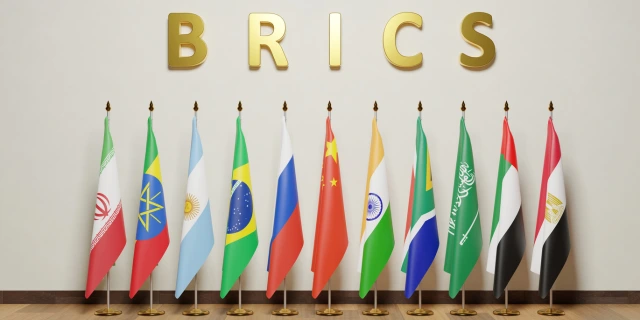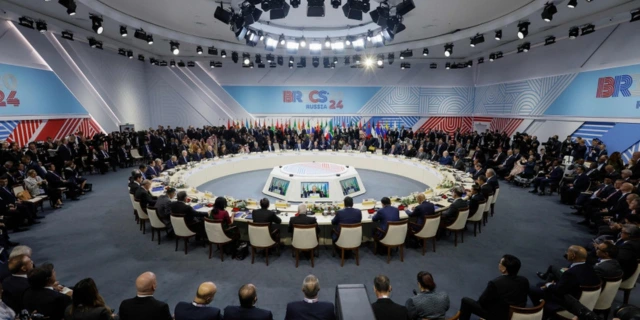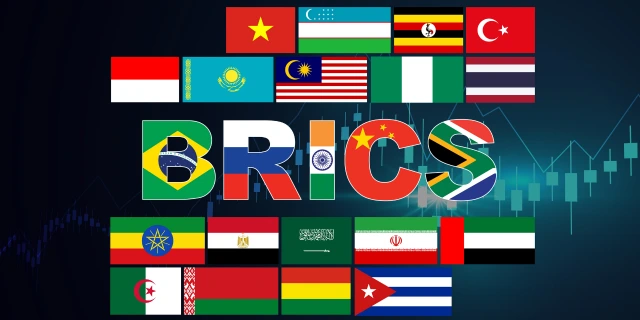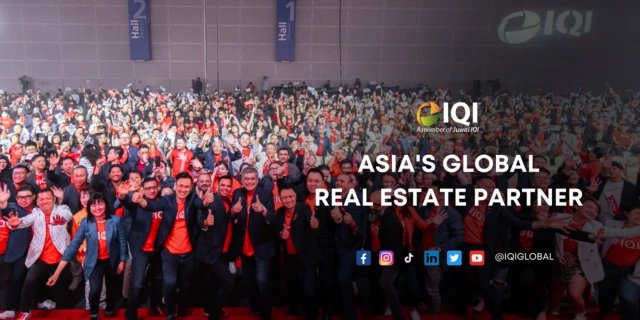With Malaysia joining BRICS as a partner nation, curiosity is mounting about the potential impacts on the country’s economic landscape, particularly in real estate and job opportunities.
This partnership promises expanded trade, investment, and technology collaborations, sparking interest among investors, agents, and market observers.
Many are eager to understand how BRICS will influence Malaysia’s local market, economy, and opportunities within the real estate sector.
Let’s explore Malaysia’s new role within BRICS, examining the opportunities, challenges, and evolving trends in property investment and the real estate job market.
Table of contents
- 1. Overview of BRICS and G7
- 2. What are the Benefits and Impacts of Joining BRICS as a Member for Malaysia?
- 3. How Does BRICS Impact Malaysia’s Property and Real Estate Industry?
- 4. Opportunities for Local Real Estate Firms to Partner with BRICS Investors
- 5. Emerging Real Estate Trends Driven by BRICS Influence
- 6. Growth in PropTech and Data-Driven Real Estate Services
- 7. Expanding Job Roles and Opportunities in Malaysia’s Real Estate and Property Market
- 8. Future Prospects: Long-Term Real Estate Market Growth in Malaysia Due to BRICS Involvement
1. Overview of BRICS and G7
i. What is BRICS?

BRICS represents a coalition of influential emerging economies—Brazil, Russia, India, China, and South Africa, founded in 2009.
With over 40% of the world’s population and a collective GDP of $26.6 trillion, BRICS was created to counterbalance Western economic blocs (G7) to foster South-South cooperation, enhance trade diversity, and reduce dependency on the US dollar.
This coalition has since expanded, adding Iran, Egypt, Ethiopia, and the UAE as members in 2024, reflecting growing interest among emerging economies in forming partnerships that could reshape the global economy.
ii. What is G7?

The Group of Seven (G7) is an informal alliance of the world’s seven leading advanced economies: the United States, Canada, France, Germany, Italy, Japan, and the United Kingdom, with the European Union participating.
Established in the 1970s, the G7 discusses global economic policies, financial regulation, and sustainable development goals, commanding a collective GDP of over $46 trillion.
The G7’s historical influence lies in setting financial norms and offering multilateral aid, with decisions that impact global economic stability, trade, and diplomatic relations.
iii. BRICS and G7: Differences and Comparison
| Feature | BRICS | G7 |
| Founded | 2009 | 1975 |
| Member Nations | Brazil, Russia, India, China, South Africa, plus new additions (Iran, Egypt, Ethiopia, UAE) | USA, Canada, France, Germany, Italy, Japan, UK, EU |
| Collective GDP | $26.6 trillion (26.2% of global GDP) | $46 trillion (approx. 50% of global GDP) |
| Population | 3.5 billion (about 40% of the worldwide population) | 776 million (less than 10% of the worldwide population) |
| Focus | Economic collaboration among emerging markets, South-South trade, multipolar currency | Financial and political stability, aid, global economic policies |
| Currency Approach | Reduce reliance on USD, encourage multipolar currency system | USD and Euro dominance |
While the G7 wields influence over established economies, BRICS’ growing footprint signifies an economic rebalancing to address the interests of developing and emerging markets.
2. What are the Benefits and Impacts of Joining BRICS as a Member for Malaysia?

i. Economic Benefits of BRICS Membership
a. Trade Expansion
Malaysia’s exports, particularly electronics, rubber, and palm oil, stand to benefit from new BRICS markets, reducing dependency on USD-based transactions.
This currency diversification also helps Malaysia manage risks tied to USD volatility, creating a more resilient trade environment.
b. Investment Opportunities
With BRICS members leading in renewable energy and infrastructure, Malaysia has the potential to attract foreign investment across technology, infrastructure, and energy sectors.
This influx can enhance economic resilience and promote sustainable development within Malaysia.
c. Access to Development Funding
The BRICS New Development Bank (NDB) offers funding for infrastructure and sustainable projects.
Malaysia can leverage this support to stimulate local growth across transportation, energy, and healthcare sectors, boosting overall economic competitiveness.
ii. Technology, Knowledge, and Cultural Exchange
a. Technology and Knowledge Transfer
BRICS fosters collaboration in fields such as science, technology, and innovation.
Malaysia’s integration into BRICS enables it to participate in joint research, technology transfer agreements, and cybersecurity and sustainable energy sector initiatives.
These exchanges support technological advancement and benefit local industries.
b. Cultural and Educational Exchange
Members participate in cultural, educational, and professional exchanges through BRICS programs.
These initiatives strengthen diplomatic relationships, foster mutual understanding, and promote closer people-to-people ties across member nations.
3. How Does BRICS Impact Malaysia’s Property and Real Estate Industry?

BRICS opens Malaysia’s property market to a broader investment pool.
The potential for property investments increases as BRICS markets show heightened interest in Malaysia’s real estate, especially in areas like Kuala Lumpur, Johor, and Penang. This expansion can also:
a. Drive Property Demand
Increased investor interest could stimulate demand in both commercial and residential properties, pushing developers to expand projects, including high-rise apartments, office buildings, and mixed-use developments.
b. Bolster Property Values
With more foreign investors drawn to Malaysian property, demand could lead to higher property values, offering potential gains for local and foreign property owners.
4. Opportunities for Local Real Estate Firms to Partner with BRICS Investors

a. Partnerships in Development Projects
Malaysia’s entry into BRICS allows local real estate firms to collaborate on large-scale residential and commercial projects with BRICS developers.
With access to BRICS capital, Malaysian firms can gain funding and expertise, enabling them to compete in high-value development projects and contribute to enhancing local infrastructure.
b. Real Estate Marketing and Consultancy Services
Firms offering consultancy and marketing services tailored to BRICS investors will play a vital role.
Those with expertise in foreign investment protocols and property management for foreign-owned assets are well-positioned to cater to BRICS clients and facilitate smooth investments.
c. Leveraging BRICS Membership for Expanded Services
Local real estate agencies can partner with foreign investors by capitalizing on Malaysia’s BRICS partnership.
Agencies may expand their offerings to include multilingual services and culturally adapted strategies to accommodate BRICS investors’ preferences and expectations.
d. Targeted Initiatives for Attracting BRICS Investors
i. International Marketing
Local firms can promote Malaysian properties in BRICS member countries, taking advantage of Malaysia’s strategic position as a BRICS partner to attract foreign interest.
ii. Cultural Training
By providing agents with artistic training, agencies can improve client relations and negotiation effectiveness with BRICS investors, fostering better understanding and rapport.
iii. Enhanced Digital Presence
Investing in digital marketing can help real estate firms connect with potential investors from BRICS nations more efficiently, expanding their reach and engagement within this emerging market.
5. Emerging Real Estate Trends Driven by BRICS Influence

a. Rise in Sustainable and Green Developments
Investors from BRICS nations are increasingly interested in sustainable real estate projects, prioritizing energy-efficient buildings and green spaces.
Malaysian developers incorporating green technologies and eco-friendly designs are well-positioned to attract these environmentally-conscious investors.
b. Demand Shift toward Mixed-Use Developments
Mixed-use properties integrating residential, commercial, and retail spaces are gaining popularity among BRICS investors, who value urban convenience.
This trend aligns with Malaysia’s urbanization goals, enhancing the appeal of Malaysian cities as dynamic live-work-play hubs.
c. Expansion of the Real Estate Workforce
As demand from BRICS investors for Malaysian properties grows, the local real estate sector may see an increase in job opportunities, attracting more Malaysians to careers in real estate to meet the surge in foreign demand.
d. Construction Boom in Urban Areas
Developers will likely ramp up construction projects to accommodate BRICS-driven demand, especially in urban regions.
This anticipated boom can further stimulate Malaysia’s economy and bolster its infrastructure.
6. Growth in PropTech and Data-Driven Real Estate Services

BRICS-driven investments are accelerating the adoption of PropTech in Malaysia, transforming the real estate sector by enhancing property transactions and management through data-driven insights and advanced technological solutions.
Malaysian firms increasingly utilize PropTech tools to improve efficiency and attract international investors.
Key applications include:
a. AI-Powered Market Analysis
PropTech enables firms to leverage AI for predictive market analysis, helping agents and investors make informed, data-backed decisions on property trends and rental yields.
This enhances strategic planning and investment outcomes.
b. Virtual Tours and Digital Platforms
Virtual tours and digital property listings allow international clients to view properties remotely, streamlining cross-border transactions and improving accessibility for foreign investors.
These digital tools make the property search process seamless and engaging.
c. Intelligent Apps and Data Analytics
PropTech applications and data analytics are invaluable for Malaysian firms with BRICS clients.
These tools help predict market trends, optimize property management, and provide better market insights, adding value to client interactions and supporting investment strategies.
7. Expanding Job Roles and Opportunities in Malaysia’s Real Estate and Property Market

a. High Demand Job Roles for Real Estate Professionals
With growing BRICS interest, Malaysia’s real estate sector is poised for job growth, particularly in roles focused on foreign investment.
Key roles include:
i. Property Investment Consultants/Advisor
Professionals who understand BRICS market trends and regulations are increasingly in demand to guide foreign investors on lucrative opportunities within Malaysia.
ii. Multilingual Real Estate Agents/Negotiators
With fluency in Mandarin, Russian, and Portuguese, these agents can effectively cater to BRICS clients, ensuring clear communication and fostering trust with foreign investors.
b. PropTech-Driven Job Opportunities
The rise of PropTech has created additional demand for tech-savvy professionals in roles such as:
i. Real Estate Digital Marketers
Specialists who can promote Malaysian real estate offerings to BRICS investors through digital channels.
ii. Property Market Data Analysts
Professionals in data analytics provide tailored insights on market trends, aiding foreign investors with data-driven decision-making.
iii. Technology Consultants
Advisors specializing in implementing and managing PropTech tools are vital for improving property management and optimizing investment outcomes.
c. IQI Global, Malaysia’s Largest PropTech Real Estate Company

As Malaysia’s real estate market evolves with BRICS, trend-driven demand, and technological advancements, opportunities for professionals to thrive in diverse roles are expanding.
Leading this industry shift is IQI Global, Malaysia’s largest PropTech real estate company, which is recognized for its commitment to technological innovation and robust agent support.
We understand that embracing PropTech and digital tools is essential to remain competitive in today’s dynamic market.
We offer advanced technology solutions and training exclusively through platforms like the ATLAS app, IQI Academy, and comprehensive marketing tools to keep our agents at the forefront.
These resources are designed to upskill agents and align them with market demands.
We provide full support to foster growth and success in your career no matter you are new to real estate, a seasoned professional, or coming from a different industry.
If you’re interested in joining a forward-thinking company with extensive career development opportunities, we are actively recruiting and welcome you to explore a future with us.
Contact us today for more information on how IQI can support and elevate your career.
8. Future Prospects: Long-Term Real Estate Market Growth in Malaysia Due to BRICS Involvement

a. Expansion of High-End Real Estate Market
The demand for luxury and high-end properties in Malaysia is anticipated to grow continuously, driven by affluent BRICS investors.
This trend contributes to the long-term growth of Malaysia’s real estate sector, attracting high-net-worth individuals and adding significant value to the Malaysian property landscape.
b. Opportunities in Secondary Cities
As property prices increase in major urban centers, BRICS investors may turn to secondary cities like Ipoh and Melaka.
These cities offer affordable real estate with solid growth potential, fostering balanced development and dispersing investment across Malaysia beyond traditional urban hubs.
c. PropTech Innovations to Meet BRICS Demand
Malaysia’s involvement with BRICS is accelerating the adoption of PropTech, making technologies like AI for predictive market analysis, blockchain for secure transactions, and VR for virtual tours increasingly essential.
These innovations streamline property sales and rental processes, enhance transparency, and improve operational efficiency, positioning Malaysia’s real estate market as a more attractive, tech-driven option for foreign investors.
d. Impact on Real Estate Agents and Tech Adoption
As PropTech gains traction, real estate agents increasingly adopt advanced technology to enhance client experiences and manage properties remotely.
Tools like VR property tours enable BRICS investors to view properties without the need to travel, boosting both convenience and sales efficiency.
e. Rising Demand for Skilled Real Estate Professionals
The influx of BRICS-driven demand is expected to increase the need for skilled real estate agents, especially those proficient in PropTech and multilingual services.
This creates valuable opportunities for real estate and tech-savvy professionals adept in digital marketing and property management tailored for international clients, enabling real estate firms to effectively meet the evolving needs of the BRICS market.
f. Data-Driven Property Investment
BRICS investors are increasingly relying on data-driven insights for strategic decision-making.
PropTech tools provide vital market analytics and transparency, making Malaysia’s real estate sector an attractive investment destination through tailored insights that empower investors to make well-informed choices.
g. Sustainable Growth through Strategic Partnerships
Malaysia’s position as a BRICS partner strengthens its role as a regional hub, attracting interest in industrial properties, urban development projects, and renewable energy infrastructure.
This partnership fosters sustainable, tech-driven growth, enhancing Malaysia’s standing in Southeast Asia’s real estate market.

Malaysia’s BRICS partnership holds transformative potential for real estate growth, economic advancement, and job creation, mainly through PropTech adoption.
Real estate professionals and investors stand to benefit from new investment inflows, advanced technology integration, and evolving job roles.
By aligning with BRICS-driven trends, Malaysia is positioning itself as a dynamic bridge between ASEAN and the BRICS bloc.
This balanced approach paves the way for sustainable and real estate growth, defining Malaysia’s path as an emerging hub in the Global South while enhancing its global visibility and economic influence.
Join IQI Global now and elevate your real estate career! Access cutting-edge PropTech tools, expert training, and full support from IQI and seasoned experts. Move your first step toward success, and apply now to become an IQI agent!
Continue Reading:
- 10 Of Your First Home Buying Questions Answered in 2024
- Forest City Johor: From Ghost Town to Duty-Free Hub
- Best House Loan Interest Rates to Get in November 2024
References and Information Related to BRICS:
The Star
- https://www.thestar.com.my/news/nation/2024/10/27/malaysia-receives-strong-support-to-join-brics-from-founders-says-anwar
- https://www.thestar.com.my/business/business-news/2024/06/24/joining-brics-right-thing-to-do-for-malaysia
- https://www.thestar.com.my/news/nation/2024/10/28/malaysia-first-country-to-be-nominated-by-brics-committee-says-anwar
Free Malaysia Today
- https://www.freemalaysiatoday.com/category/nation/2024/10/24/malaysia-becomes-brics-partner-country
- https://www.freemalaysiatoday.com/category/nation/2024/10/28/brics-leaders-applauded-after-malaysia-made-partner-says-anwar
- https://www.freemalaysiatoday.com/category/nation/2024/07/05/brics-membership-malaysias-potential-benefits-and-challenges
New Strait Times
Sinar Harian
Malay Mail
BuletinTV3
https://www.buletintv3.my/nasional/video-brics-langkah-strategik-malaysia-di-persada-ekonomi-global/
East Asia Forum
https://eastasiaforum.org/2024/08/18/malaysias-brics-bid-to-build-on-its-allegiance-to-asean
Bernama
- https://www.bernama.com/radio/news.php?id=2356791
- https://www.bernama.com/en/news.php?id=2331980
- https://www.bernama.com/en/news.php?id=2355720
The Laotian Times
Channel News Asia (CNA)
https://www.channelnewsasia.com/commentary/malaysia-join-brics-gaza-china-economy-trade-4434311
